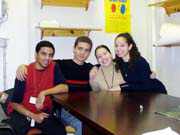High school can be a tough place, especially for an incoming freshman who doesn’t know what to expect out of the experience except rumors and hearsay. This is why the Memorial High School Peer Leadership and Mediation Program was created.
In its 10th year, the program takes interested students through many levels of training and teaches them skills that will assist them in becoming mediators and leaders within the school community.
The program is headed at Memorial High School in West New York by Peer Leadership Coordinator Ed Donnelly. Donnelly, by his own admission, came to the program with little experience in the field of peer mediation. After teaching physical education for 25 years, Donnelly was understandably overwhelmed by it and, much like many freshmen, had no idea what to expect.
"I remember the first time I went to a peer leadership session, I cried. These kids were coming out with such personal stuff, it just blew me away."
To become involved in the program, a student must first be recommended by a teacher, either when the student is in grammar school or high school. The student must show leadership qualities and not be afraid to talk through problems.
Said Donnelly, "This is really a unique situation at Memorial in that the Peer Mediation/Peer Leadership Program is actually part of the curriculum. Three different classes are part of the overall program. This isn’t as superficial as some after-school program. It is part of the fabric of Memorial."
After the students’ freshman year, students go through a "tryout" period where they are supervised by 30 to 40 older, established members of the peer program in small to large group settings. They go through group problem-solving scenarios and are judged on how they operate under those circumstances.
Once the students get to their sophomore or junior year (depending on when they started in the program), they will have been picked to be part of the program and will have already been in the Peer Mediation class, which teaches specific conflict resolution techniques. According to Donnelly, about two thirds of the way through that year, the students will be "mediation ready." Anyone who has reached this point is welcomed, in their senior year, to take the advanced mediation class.
According to Donnelly, "In this class, we get into and understand diversity issues, some really challenging societal issues that extend outside the doors of Memorial."
Apparently, the Peer Leadership students are looked up to and respected at Memorial.
"Many people in the school are very aware of the power of the mediation process," Donnelly said. "It’s about taking kids that care and putting them together. I think that a lot of the kids that aren’t in the program know it exists and instead of getting into a conflict will come to us."
"It’s a powerful force," added Donnelly.
What makes the program work, according to Donnelly, is that any student that comes in to discuss a problem feels an almost instant empathy from the Peer Mediators. After all, they’re all students. Said Donnelly, "Anyone in conflict whether internal or external can come to us and not be judged and be respected. They are instrumental in establishing a climate of trust."
Added Donnelly, "What the mediators do is ask open-ended questions to the disputants. They never give advice but the get responses and empathize with the student. Everything is confidential. I don’t get involved unless it becomes a physical danger-type situation."
Donnelly also mentioned that the Peer Mediators are need now more than ever as it seems that many students, male and female alike, are apparently very ready to get into a conflict.
"It’s amazing the speed with which some of these kids get set off," said Donnelly. "All it takes is a rolling of the eyes. A lot of these kids think that ‘respect’ is all they have, and so if somebody challenges that, it can get ugly."
Peer mediators
A group of peer mediators were present in the Memorial High School "Drop-In Center" and were eager to talk about the program that they have all been, to a greater or lesser degree, in for years.
Louis Baez, 17, Crystal Maldonado, 17, Marilyn Garcia, 17, and Victor Ramos are a few of the students that are involved with the program and to hear them tell it, it’s been a life-changing experience. Especially for Ramos, who, by his own admission "didn’t mind getting into conflicts."
Made aware of the program by an ex-girlfriend, the Peer Mediation caused a sea-change in Ramos that continues to this day. Said Ramos, "It’s definitely made me the person I am today. I wasn’t on a good path, and this program has changed it."
All agreed that their relationships with their parents has been greatly improved.
Said Louis Baez, "It’s really become second nature. We all use the skills we’ve learned in many different areas in our lives." Added Baez, "This program is not about blending in. It’s about being good people for everyone else."
Baez mentioned that sometimes teachers expect too much of the Peer Mediation students. Said Baez, "They’ll sometimes say ‘You should do [such and such], you’re a peer leader.’ But they forget that we’re students too."
But the fact that teachers are invited to be a part of the program is a good thing, according to the students. "It really breaks down the barriers between us," Baez said.
